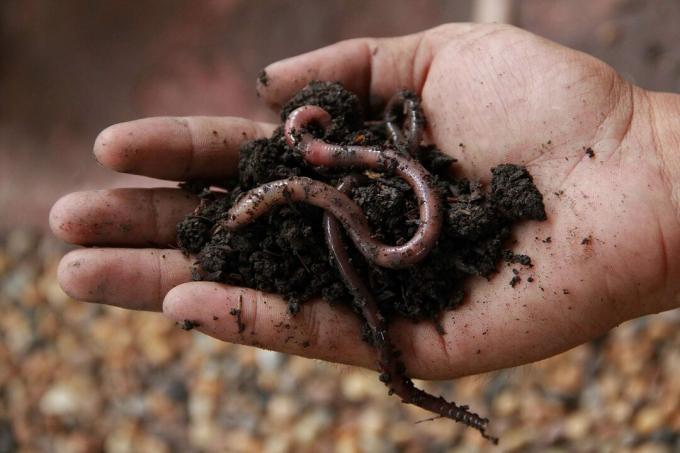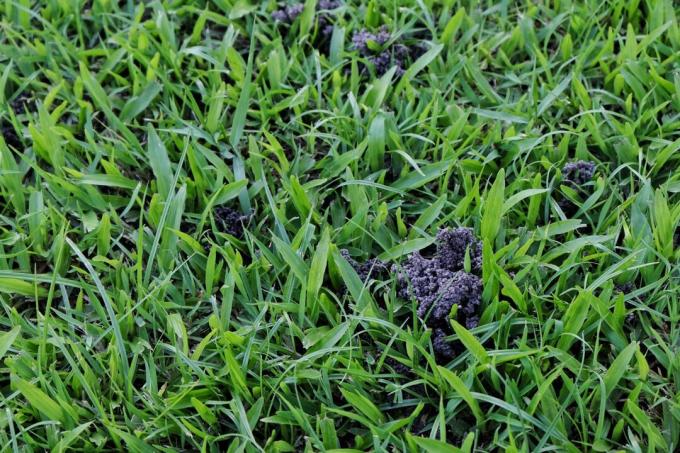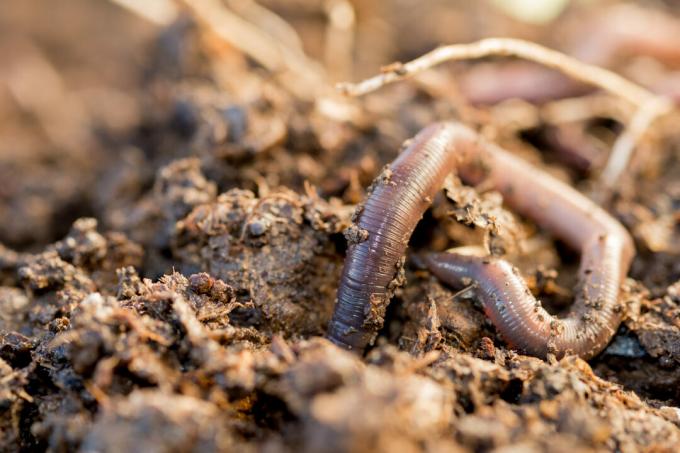Not disgusting at all, but useful - earthworms are real heroes in the garden. Here you can find out why earthworms are so important for our beds.

Small, slippery, unappetizing - worms are not exactly the prettiest creatures to be found in our gardens. Many people even find the small animals really disgusting and would like to ban them from their garden. But that's not a good idea: Despite their inconspicuous appearance, earthworms (Lumbricidae) – like the common earthworm (Lubricus terrestis) – invaluable for a healthy garden. The worms are especially good for the soil. An old French peasant saying says: "God knows how to make fertile soil, and he has his secret earthworms.” We reveal what advantages these little creatures have for our soil and why no garden should be without them you here.
contents
- 1. Earthworms as garbage disposal
- 2. fertilization by earthworms
- 3. Earthworms improve the soil structure
- 4. Mixing by the hard-working worms
- 5. Minimizing soil erosion with earthworms
1. Earthworms as garbage disposal
A common misconception is that earthworms feed on soil and dirt. In fact, the favorite food of worms is something completely different: plants. But don't worry, the earthworm doesn't attack the good lawn or the expensive roses, but tidies up the garden properly, because on his menus there are mainly rotting ones plant remains. The nocturnal worm likes to pull leaves, green waste and dead plants into its burrow and thus boost the composting of plant waste.

Garden waste and leaves rot much faster in a garden with lots of earthworms than in a garden without the little helpers. Especially the compost earthworm (Eisenia fetida) is a true silver bullet when it comes to recycling green waste: It reliably turns garden waste into practical compost, is even sold because of its ability and deliberately placed in compost heaps.
2. fertilization by earthworms
If you eat a lot, you also have to go to the toilet - this is also the case with earthworms. In fact, the small piles that so annoy many lawn lovers are a real blessing for the garden. After the digestion of leaves and other organic substances, it is not the remains of ordinary soil that remain, but highly concentrated components of plant-available nutrients. In fact, worm droppings contain almost five times more nitrogen, seven times more phosphate and even eleven times more potassium than regular garden soil, making it perfect as a fertilizer. But not only the plants benefit from the excretions, the soil also benefits from the earthworm droppings. This consists of particularly fine humus particles that form so-called clay-humus complexes. These ensure a better and more stable soil structure and are perfect for binding and storing the minerals that the earthworm also releases. As a result, the nutrients remain in the soil for a long time and have a long-term effect on plant nutrition.

3. Earthworms improve the soil structure
Earthworms are not only known for their looks and good fertilizer, but also for their ability to dig tunnels. What doesn't sound particularly spectacular at first actually has a decisive impact on the structure of the soil: Since the Because the small tubes are specially lined by the earthworm, they are extremely stable and also conduct air and water into the deeper layers of the earth soil. The better aeration of the soil stimulates the decomposition of plant material in the deeper layers of the earth. Since oxygen often does not penetrate into these layers of earth, which occurs in numerous processes of decay plays a crucial role, the decomposition of organic material occurs in many soil layers only slow.

However, these layers are also sufficiently supplied with air through the burrows of the earthworms and the dead plant parts can be decomposed better. But water also penetrates the soil much better through the smaller tubes - this significantly minimizes the risk of waterlogging. At the same time, the water remains in the soil much longer due to the so-called sponge effect and the soil dries out more slowly during periods of drought.
4. Mixing by the hard-working worms
While we're on the subject of earthworm burrows, we mustn't cover another important aspect of earthworms forgotten: The small tunnels not only ensure good ventilation, but also a good mixing of the soil. Soils are often divided into many different layers, which are reflected in different properties - such as for example in their structure, but also in the content of certain nutrients - differ from each other. When digging and eating, some species of the small worms build burrows that reach up to 2 m deep into the ground. They mix the different layers together. For example, they pull leaves deep into the earth where there is hardly any organic material left. At the same time, they bring valuable minerals with them from the deeper layers, which prove to be excellent fertilizers for the plants on the surface. This mixing of the soil changes the soil structure for the better and remains fertile and stable over longer periods of time.

5. Minimizing soil erosion with earthworms
Sandstorms not only occur in deserts and on tropical islands, but have also become a reality in Germany. Wind, water and weather take their toll on our soil and, in the worst case, carry it to another place. Above all, soil erosion by water does not stop at hobby gardeners and wears away parts of the precious upper layer of soil year after year. The result: with each new shower, soil fertility deteriorates. Luckily, there is a savior - studies show that earthworms can significantly reduce erosion. On the one hand this is due to the improved soil structure and stability, but on the other hand also to the long earthworm burrows. This allows the water to seep into the ground and not run off above ground, which could take valuable soil with it. At the same time, the clay-humus complexes bind the valuable minerals and nutrients so well that they are not washed out by the rain. The earthworm ensures that the soil in our garden remains fertile for a long time.
If you are now wondering how you can attract as many earthworms as possible into your garden, then there is an important keyword to mention: sustainable gardening. Chemicals in the soil logically drive away the useful little animals, which is why you should definitely use organic products in the garden that are as gentle as possible on plants, animals and the environment. You can also make the difference when it comes to fertilizing by using organic long-term fertilizers like ours Plantura organic fertilizer set.

Plantura organic soil activator
Effective long-term effect, good for the soil, harmless to humans, animals and nature
...and receive concentrated plant knowledge and inspiration directly in your e-mail inbox every Sunday!

